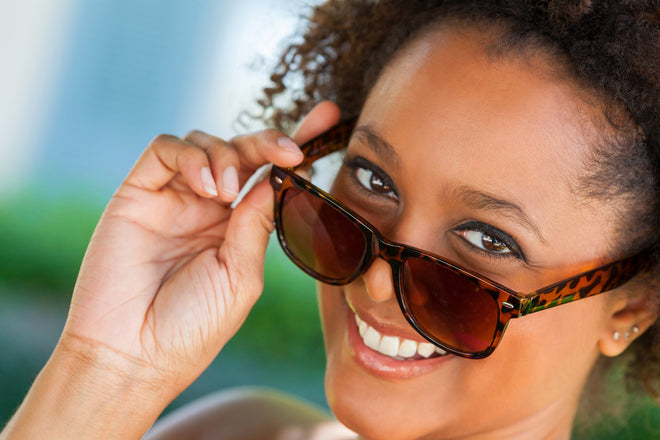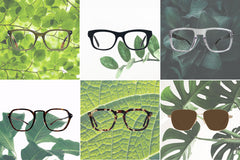I live in Arizona where the sun is constantly on my mind. Sunglass stores do very well here since we get sunlight the better part of the year. With the constant sunlight lies the threat of ultraviolet UV rays to deal with. They damage not only the paint on our cars and houses but also our eyes. That is why it is important to consider protecting your eyes from the sun to avoid harmful eye conditions.
How Does the Sun Damage Eyes?
Before learning what conditions are caused by harmful UV rays, it’s important to first understand what they are. Ultraviolet, or UV rays, can be broken down into three types within the invisible light spectrum: UVA, UVB, and UVC. Each type affects the skin and eyes differently.
UVA reaches the deepest parts of the skin. While it isn’t as powerful as the other UV rays, it still packs a punch. 95% of this type of UV radiation reaches the earth and causes our skin to age and eyes to become damaged.
UVB rays affect the outer layer of skin, or the epidermis. This type of UV causes sunburns which result in skin cancer. Moreover, this type of UV is very damaging to the eyes.
UVC rays cause the most damage to the skin. The good news is that this type of UV is mostly absorbed by the Earth’s ozone layer.
Eye Conditions Caused by UV Rays
So what eye conditions do UV rays cause? As you can imagine, many eye conditions can surface due to harmful sunlight exposure. The primary ones are:
- Cataracts: One of the leading causes of blindness in the United States. This is where the lens of the eye gets cloudy or opaque, resulting in decreased vision. The only way to treat cataracts is to extract them and replace them with an artificial lens.
- Macular Degeneration: Another leading cause of blindness due to overexposure to UV light. The macula, which is responsible for the center of your field of vision, is damaged by UV radiation, and that causes loss of your central vision.
- Pterygium: A pinkish benign growth on the sclera (white part of the eye) on either side of the cornea. It is a sensitive tissue and can easily become red and irritated. This can cause stinging and discomfort of the eye.
- Cancer of the Eye: The eyelid is a part of the eye that is vulnerable to melanoma and skin cancers. If you see discoloration of the eyelid or a suspicious “bump,” visit your nearest eye doctor to make sure it isn’t cancer.
- Sun Burn of the Eye: The cornea (front part of the eye) can be harmed by UV rays. This causes pain, redness, irritation, and blurriness. It is very unpleasant and requires treatment from your optometrist/ophthalmologist to limit the damage.
Because of the detrimental effects of UV rays on the eye, you must take precautions when you’re outdoors like wearing a wide brim hat, wearing sunscreen, using artificial tears, and - most importantly - wearing sunglasses to shield the eye from the damage mentioned above.
How Sunglasses Protect Your Eyes from UV Rays
Sunglasses are commonly thought of as fashion accessories, but did you know that they also protect your vision? However, not all sunglasses are equal. Look for the following when shopping for UV blocking sunglasses:
Quality sunglasses use lenses that:
- Block 99 to 100 percent UV-A and UV-B radiation
- Are free of distortion
- Should be optical quality plastic lenses, for increased durability and lightness
- Are polarized to block light reflected off surfaces like water or snow
High-quality sunglasses should:
- Be the right size for your face, fit well and not slip off your face or be too tight
- Wrap around your face so that UV Rays do not penetrate easily
- Have larger lenses so that they cover more than just your eye area
- Have a sturdy case so they are protected from frame and lens damage
As you can see, the long - term threat of UV radiation can be mitigated by the use of quality sunglasses. Good sunglasses help delay the threat of age-related eye diseases like Macular Degeneration, Cataracts, and Pterygium. This can go a long way toward giving you peace of mind that your eyes are taken care of and your vision is protected.




